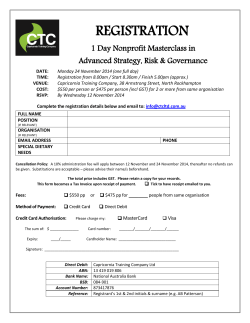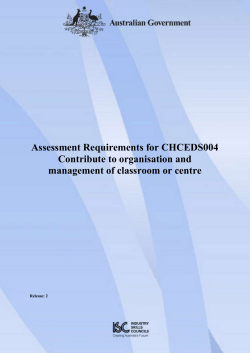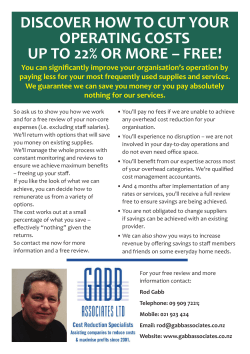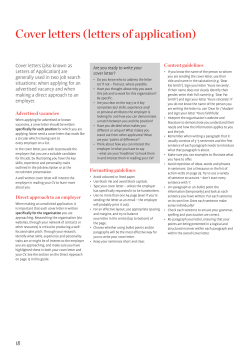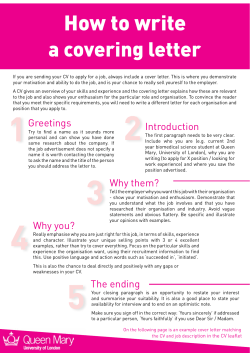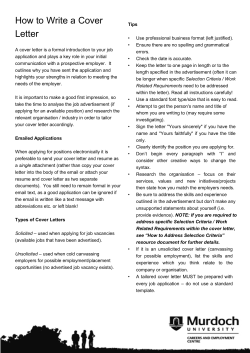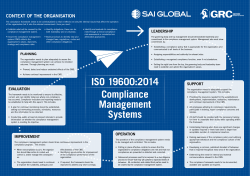
When you apply for a job, you will often be... covering letter. This explains: How to write a compelling statement
How to write a compelling statement When you apply for a job, you will often be asked to provide a personal statement or covering letter. This explains: 1. Why you are interested in this post. 2. How your skills and experience make you suitable. The statement should complement rather than duplicate your CV, and enable you to make an initial personal connection with the reader so that they want to find out more about you. It is a chance to sell yourself to the employer and set yourself apart from other candidates. Employers will often decide whether to even look at your CV or completed job application on the basis of this statement – so it’s crucial to take the time and effort to get it right. An intelligent personal statement from a qualified candidate can make the difference in getting an interview. The best statements demonstrate an individual spark as well as a good understanding of the organisation and the requirements of the role. When a job is advertised, the employers have analysed the kind of skills and experience needed, and outlined these in the Person Specification in the Job Description. In order to select the best candidate, each applicant is measured against the Job Description. When you write a statement always focus on demonstrating, with evidence and examples, how you meet the specific criteria required. Start by putting yourself in the place of the person reading your statement. What will they be looking for? Imagine that they may be reading 50 or 100 statements, so how can you make it easier for them to get the information they need from your statement? How can you make your statement stand out? Tips on how to write a successful statement • • • • • • Read, understand, and follow the instructions. Use a modern, standard font and clear, simple lay-out. Use headings where appropriate. Try to stay within the recommended page or word limit. Keep it succinct and compelling. Tailor your statement to the position and employer. It gives a poor impression if your application for the post of Director of Oxford HR is headed “Sales Director – Alpha Sales”. Do your research on the organisation and demonstrate this when you explain why you are interested in the role. You might refer to the organisation’s success in a certain field, or to values that you share. Use industry buzzwords if appropriate. Strongly convey how your skills and experience make you suitable for this position. A useful way to do this is to copy the Person specification, and make each point a heading in bold. Under each heading write bullet-points, explaining www.oxfordhr.co.uk | 01865 403232 • • • • • • exactly how you meet the criteria. In the interests of keeping the statement succinct and interesting, you may decide to group some of the points together, rather than addressing each individually. Be honest. Do not repeat verbatim what is included in your CV. Use the statement as an opportunity to bring out the points relevant to the employer. Always provide demonstrable evidence to back up any statements or facts. Check spelling and grammar – a statement showcases your writing ability. Always proofread your documents and get someone else to check them. Use formal, professional language. Remember, a statement is there to attract and maintain the interest of the employer. Don’t forget to: • • • • • • • • Save the document with your name, type of document and date e.g. Pat-JonesStatement-1307, or according to the instructions provided. Head the document with your name and job title applied for and put the date in the footer. Address your statement to the correct person – find out their name(s), and spell them correctly. Follow business letter protocol, for example, Dear Sir... Yours faithfully or Dear Name...Yours sincerely. Provide an introduction: State which post you are applying for. Highlight why you are interested in the post and the organisation. Use a short, arresting sentence to get their attention. Mention if you have had some connection with the organisation, and what impressed you. Emphasise what you can do for the organisation, not vice versa. Genuine enthusiasm and evidence that you have done your homework will stand out. Relate your skills to the competencies required in the job description and provide evidence to back up your claims. If you do not have the relevant skill or experience, be honest, and cite a transferable skill or willingness to learn. Close on a positive note. Provide contact details below your signature. Common errors • • • • • Ignoring instructions. Poor spelling and grammar. Use of clichés, stock phrases and abbreviations. Too much use of the word “I”. Focus on the organisation rather than yourself. Addressing your letter to the wrong person. www.oxfordhr.co.uk | 01865 403232 2 • • • • • • • • • • Using a standard letter which is not tailored to the specific role. Failure to mention the organisation and role applied for. No evidence of enthusiasm or motivation. Failure to provide evidence of competencies. Exaggerating skills and achievements. Repetition of the CV. Including too much information. Including salary expectations – do not mention this unless specifically requested to do so. Applying for posts which are clearly unsuitable. Naming the document “Statement” or “CV” without a name or date. www.oxfordhr.co.uk | 01865 403232 3
© Copyright 2025





